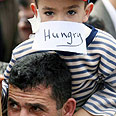EU leaders have endorsed an estimated 100 million euro (USD 126 million) aid package to the Palestinians, to be paid via a new funding mechanism from next month.
The European Commission spokeswoman said the aid package was divided into three parts, including an element focused on the health sector, extending a funding program currently operating through the World Bank.
The other two parts were a contribution for essential utilities, including fuel, and a "social safety net" to come into effect later which would involve paying money directly into accounts of individuals based on their needs.
"We are proposing something in the order of 100 million euros," said Emma Udwin, spokeswoman for EU external affairs, without specifying what period of time it would be distributed over.
She reiterated that the EU is very close to reaching agreement with its Mideast Quartet partners on the temporary funding mechanism for the Palestinians bypassing their Hamas-led government.
"We hope we can see that final endorsement in the coming days," she said.
The European Commission has been trying to draw up a mechanism that would see funds reaching Palestinians in need without money going directly to the Hamas-led government, which refuses to renounce violence or recognize Israel.
The EU is by far the biggest aid donor to the Palestinians - giving some 500 million euros a year -- but it froze some of those funds in April when Hamas came to power but refused to renounce violence or recognize Israel.
The terror group is deemed a terrorist organization by both the EU and the United States.
The Palestinian Authority has struggled to pay the salaries of its 160,000 civil servants, threatening the livelihoods of one million Palestinians - a quarter of the population in Gaza and the West Bank.
The issue of "social allowances" - shorthand for helping public servants deprived of wages - is reported to have run foul of US banking laws and has been holding up final agreement on the mechanism.
"These are payments to individual people, but there is still work to be done to establish exactly how the recipients would be selected and how this would operate," Udwin explained.
















